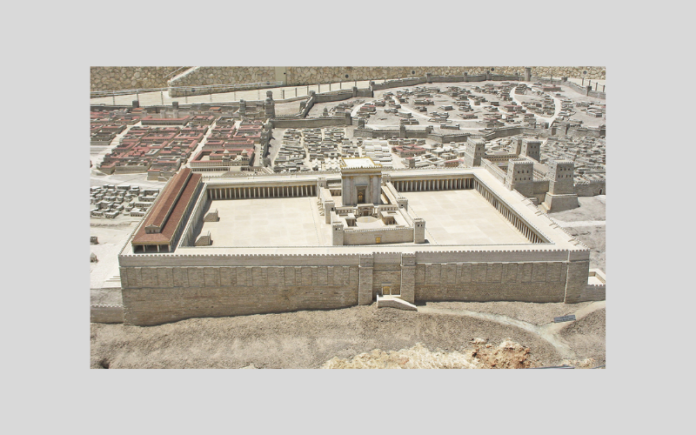Frank Talmadge
Commentary, October 1981
The liturgy for the Ninth of Ab, the day of fasting which marks the destruction of the First and Second Temples as well as other tragedies in Jewish history, laments the fate of Jerusalem, “The mournful, wasted, degraded, and desolate city.” Every year the Israeli rabbinate is asked if one must still say these words, if indeed it is not now blasphemous to say them at all. And every year the rabbinate furnishes its rabbinical answers. From my window in Jeruslaem, where I often spend the summer, I view the frenetic activity of the Ramot Eshkol shopping center, the bands of tourists and children scurrying across Ammunition Hill, the luxurious homes on Givat Hamivtar, and it takes more inner vision than I can muster to see a wasted and desolate city.
It is not that the Ninth of Ab no longer has any meaning or that mourning is inappropriate; it is that these surroundings are not conducive to it. The situation evokes and is evoked by the words of a contemporary Catalan poet, Salvador Espriu, in his The Bull-Hide (La pell de brau, 1960):1
And so we know that we are still
scattered across the earth,
blown by the winds, by the pilgrimage
of the Golah.
And we no longer want to weep
for the Temple,
nor suffer infinite longing
for Jerusalem, our city.
(The Bull-Hide VII)
Espriu, of course, is expressing concerns of his own, but his words are not inappropriate to my thoughts.
It is the words of another, earlier Catalan poet, Bonaventura Carles Aribau, that help me out of my quandary. Aribau’s “Ode to the Homeland” (“Oda a la pàtria,” 1833) was to become the clarion call for the 19th-century Catalan literary revival, the Renaixença. Writing the poem from distant Madrid, he gave vent to his longing for his homeland and bade adieu to “la tomba del jueu” (the tomb of the Jew). For the Catalan, the “tomb of the Jew” was a metonym for Montjuich, the mons judaicus, the great hill which housed the medieval Jewish burial ground of Barcelona and which dominates the city, serving as one of its principal landmarks. For the Jew, the reference to that particular tomb may be read as an allusion to Catalonia itself, indeed to all of Spain. There, Israel, the “ever-dying people” in Simon Rawidowicz’s phrase, was to be buried—like the biblical Jephthah—in the cities of the land, in 1391, in 1414, in 1492, in years prior and in years since. Among the other tragedies which Jewish tradition associates with the Ninth of Ab is that very one of 1492—the expulsion from Spain. Tombs are for mourning; I shall go to Catalonia.
If you Wish to find Jews in Catalonia with whom to share the fast, you must go to Barcelona, the home of Spain’s largest Jewish community and of the first synagogue officially consecrated since the Expulsion. The medieval community of Barcelona met its end, for all practical purposes, relatively early—in 1391. Justice would dictate that the new beginning should take place here. This booming industrial and financial capital of Spain has always gone its own way—politically, ideologically, even visually. This is the hub of the land of Dali, Picasso, Miró, and Antoni Gaudí, whose architecture is encountered not only in the ever visible “gingerbread spires” of the Church of the Holy Family and the Güell Park but, when least expected, at street corners and on the major and minor thoroughfares. The visitor is not at first blush easily reconciled to an architectonic which draws its inspiration from the rock formations, flora, and waterfalls of the Catalonian countryside rather than from a textbook of solid geometry. But if even Franco had to be somewhat resigned to Catalan audacity, the receptive tourist soon makes his peace with it. Barcelona was the last city to fall to Franco and he knew ever after that it was the one place of which he had better steer clear. He was to have his revenge.
To Read the Full Article Click Here






